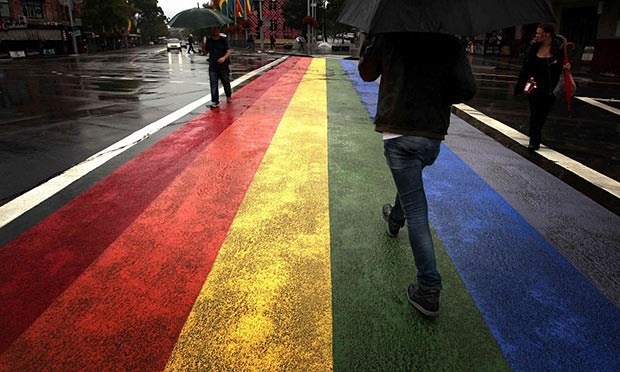It’s that hectic time of year for academics when papers and exams pile up and the end-of-year holidays loom large. In the midst of it all, I’ve been dividing my attention between the knowledge projects that interest me most: queer feminist theory, religious studies, and feminist science studies – particularly those engaged with the climate change and the politics of our new global epoch which some have christened the Anthropocene. Responding to Mary Jo Nietz’s “Gender, Queer Theory, Religion” interview provides an excellent opportunity to bring these projects into more explicit conversation with each other.
Beginning with important basics – What is gender? How is it different than sex? – Martin Lepage expertly leads Neitz into a substantive conversation about the impact of post-structuralist thinking, particularly Judith Butler’s work, which many consider foundational for queer theory. Given the brief structure of the interview, Neitz provides excellent summaries of what she describes as Butler’s complicated liberatory project, which eschews the powerful and persuasive essentialism one so often sees in pop culture.
Having provided an introductory outline of feminist queer theory, the interview then attends to the ways it might be used in studies of religion. Neitz proposes several options. She briefly mentions (but does not provide details) that one can use queer theory to critique religion. She then moves to the question that most interests her: how might we use queer theory to find spaces of opening or possibility for playing with categories? She elaborates by asking how beliefs might open spaces for marked groups (e.g. gay men in the Roman Catholic Church).
More specifically, she is looking for places where there are “openings to the sacred” that allow people to play with heteronormative categories. She describes some of these contradictory sites and explains that, as an ethnographer, she looks for transgressions of gender norms in the social formations she studies. She then applies a Butlerian lens to these transgressions in a way that differently focuses attention on previously unmarked groups. Lastly, Neitz notes that more and more sociologists are attending to affect theory, which is rooted in queer theory. She briefly outlines her framework for understanding religious cultures in terms of (conjuring yet tweaking Weber here) ideal affects and arousal levels that she associates with different religions.
Lepage concludes the interview by asking Neitz how she sees the future study of religion unfolding in relation to Butler’s work and queer theory. Neitz remarks that while she can’t predict the future, the most influential use of Butler in the study of religion can be found in Saba Mahmood’s work, which challenges the foundations of neoliberal discourse by posing the question of just what a feminist liberatory project is.
Overall, this interview provides a useful introduction for scholars interested in becoming conversant with queer theory and its potential applications in religious studies. I concur that queer theory can be used to critique religion and/or to open up spaces of possibility for playing with categories, particularly when one attends to transgressions. Like Neitz, I also have much appreciation for current work on affect and religion. Along these lines, I recommend Donovan Schaefer’s recently published book, Religious Affects: Animality, Evolution, and Power.
While I generally agree with Neitz’s overview of queer theory, there are a couple of places where her religious studies language raises warning flags for me. The first concerns her statement that she is interested in how beliefs might open spaces for marked groups. Here it is the recourse to belief as the primary object of study that gives me pause. A belief-centric approach does not radically alter the Protestant-based frameworks for understanding many social formations constituted as religions. Here, Manuel Vasquez’s work on a materialist theory of religion might provide tools that better align with the material bodies at the center of queer theory.
The second instance where Neitz’s language tripped me up occurred when she explained that she is interested in places where there might be “openings to the sacred.” Here her language fails to register the many critiques that have been waged against uniform understandings of “the sacred.” The most recent iteration can be found in Russell McCutcheon and William Arnal’s book, The Sacred is the Profane: The Political Nature of Religion. The radical understanding of discourse underpinning so much of queer theory ought to also be applied to religious studies categories so that the “sacred” is understood as yet another discursively produced category on a planet where, as Durkheim argued over a century ago, the most basic classification operation employed by religions is that which divides the world into sacred and profane.
Speaking of our planet, let’s conclude this journey through knowledge projects by returning to those regarding our current epoch. As the Earth’s northern hemisphere moves farther from the sun, the World Meteorological Organization has released a report indicating that the global average surface temperature this year is on track to be the hottest year on record and will likely reach the symbolically significant milestone of 1° Celsius above the pre-industrial era. Not a moment too soon, nearly 200 world leaders are converging on Paris for the United Nations conference on climate change.
Confronting this potential planetary catastrophe, Bruno Latour’s interviews with him recorded in Edinburgh where he elaborates on his project).
What might a queer feminist engagement with Latour’s proposals look like? If we return to the basic task of analyzing how and when gendered operations take place while also remembering Durkheim’s insight regarding the division of the world into sacred and profane, it becomes apparent that the modern constitution that divides the world into sacred and profane, religious and secular, could use some queering. This is one of the tasks I have begun to take up in my work, and I offer it as a provocation to others who may share my interests and commitments. If Neitz’s position as advisor to the Black Earth Institute is any indication, our different modes of working with queer theories and religious studies share an orientation toward what feminist science studies scholar, Maria Puig de la Bellacassa, has termed “matters of care.” As we confront the urgent problems of the here and now, these shared commitments matter most.
Suggested Reading
Arnal, William E. and Russell T. McCutcheon. The Sacred is the Profane: The Political Nature of ‘Religion.’ New York: Oxford University Press, 2013.
Butler, Judith. Gender Trouble: Feminism and the Subversion of Identity. New York: Routledge, 2006.
Haraway, Donna. “Anthropocene, Capitalocene, Plantationocene, Chthulucene: Making Kin.” Environmental Humanities. 6(2015): 159-165.
Mahmood, Saba. Politics of Piety: The Islamic Revival and the Feminist Subject. Princeton: Princeton University Press, 2005.
Muñoz, José Esteban. Disidentifications: Queers of Color and the Performance of Politics. Minneapolis, University of Minnesota Press, 1999.
Puig de la Bellacasa, Maria. “Matters of care in technoscience: Assembling neglected things.” Social Studies of Science. 41.1 (2011): 85-106.
Schaefer, Donovan. Religious Affects: Animality, Evolution, and Power. Durham: Duke University Press, 2015.
Vásquez, Manuel A. More Than Belief: A Materialist Theory of Religion. New York: Oxford University Press, 2011.



